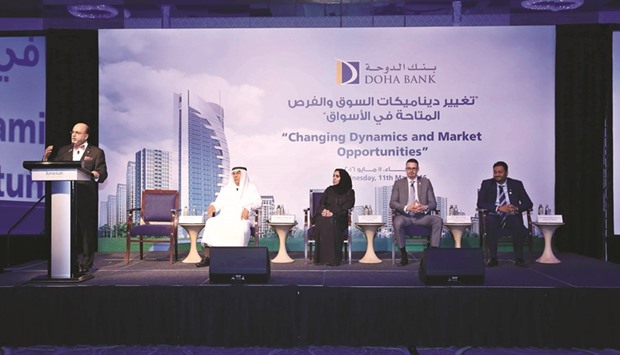Doha Bank has hosted a knowledge sharing session entitled “Changing Dynamics and Market Opportunities” in the Gulf Co-operation Council (GCC) held in Abu Dhabi recently.
Key speakers included Talal Touqan, head of Research and Advisory at Al Ramz Capital; Padmanabha Acharya, partner at Deloitte; Huda al-Matroushi, executive board member of Abu Dhabi Business Women Council; and Mohan Jashanmal, owner, Jashanmal National Company, and chairman of the Indian Business and Professional Group, Abu Dhabi.
During the event, Doha Bank Group CEO Dr R Seetharaman discussed the global and regional economies. He said: “The recent IMF outlook forecasted global growth at 3.2% in 2016. Growth in advanced economies is projected to remain modest, in line with 2015 outcomes at 1.9% this year. Emerging and developing economies are expected to grow at 4.1% this year.
“The global economy was increasingly vulnerable to downside risks, including further market turmoil in the wake of this year’s China-led downturn. Growth in the GCC is now expected to decline from 3.3% in 2015 to 1.8% in 2016. In 2016, the Saudi economy was expected to grow by 1.2%, Qatar at 3.4%, Oman (1.8%), and Bahrain (2.1%).”
Citing the IMF April 2016 outlook, Seetharaman said the UAE economy is expected to grow by 2.4% this year, while Abu Dhabi is projected to grow at 1.7% in 2016.
In real terms, Seetharaman said, non-oil activities accounted for 50.2% of the GDP at constant prices in 2014. As part of Abu Dhabi’s Economic Vision 2030, he said the contribution of the non-oil sector is aimed to be 64% of GDP.
Seetharaman said domestic and government credit demand has risen by 8.1% year-on-year in February 2016, while demand from government-related enterprises (GREs) climbed by 5.5%.
Lower oil revenues are driving tightening of liquidity, according to Seetharaman. “Government deposits were down 13.9% y-o-y in February 2016. Combined government and public sector deposits, meanwhile, had fallen by 5% y-o-y in February 2016. The trade balance between Qatar and Abu Dhabi had reached $6-7bn. Recently Abu Dhabi has issued benchmark dual-tranche of five and 10 years bonds worth $5bn. The low oil prices have emphasised on fiscal discipline and liquidity management,” he said.
Touqan, who spoke on “Oil Paradigm Leads to Different Investment Themes,” highlighted factors which are responsible for oil prices to drive equity markets, while Acharya delivered a market overview and discussed key business issues.
Al-Matroushi, on the other hand, spoke on “Changing Dynamics and Market Opportunities from the Perspective of Businesswomen,” while Jashanmal spoke about the history of UAE’s business environment from the 1960s onwards and the support given by the government.

Seetharaman sharing his insights on global and regional economies during a knowledge sharing session held in Abu Dhabi.
